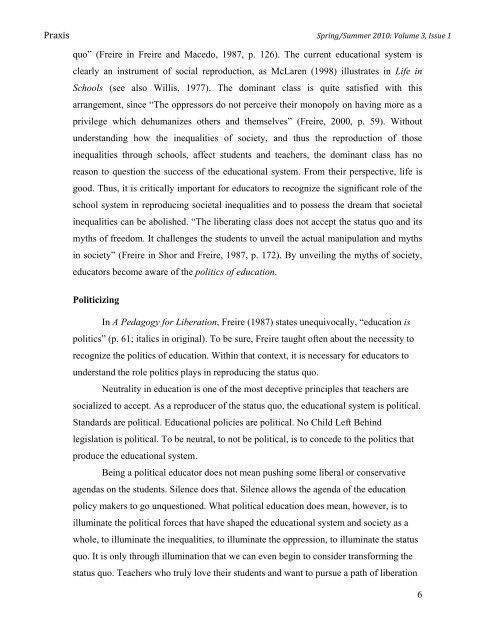PRAXIS - Paulo Freire Institute
PRAXIS - Paulo Freire Institute
PRAXIS - Paulo Freire Institute
- No tags were found...
Create successful ePaper yourself
Turn your PDF publications into a flip-book with our unique Google optimized e-Paper software.
Praxis Spring/Summer 2010: Volume 3, Issue 1<br />
quo” (<strong>Freire</strong> in <strong>Freire</strong> and Macedo, 1987, p. 126). The current educational system is<br />
clearly an instrument of social reproduction, as McLaren (1998) illustrates in Life in<br />
Schools (see also Willis, 1977). The dominant class is quite satisfied with this<br />
arrangement, since “The oppressors do not perceive their monopoly on having more as a<br />
privilege which dehumanizes others and themselves” (<strong>Freire</strong>, 2000, p. 59). Without<br />
understanding how the inequalities of society, and thus the reproduction of those<br />
inequalities through schools, affect students and teachers, the dominant class has no<br />
reason to question the success of the educational system. From their perspective, life is<br />
good. Thus, it is critically important for educators to recognize the significant role of the<br />
school system in reproducing societal inequalities and to possess the dream that societal<br />
inequalities can be abolished. “The liberating class does not accept the status quo and its<br />
myths of freedom. It challenges the students to unveil the actual manipulation and myths<br />
in society” (<strong>Freire</strong> in Shor and <strong>Freire</strong>, 1987, p. 172). By unveiling the myths of society,<br />
educators become aware of the politics of education.<br />
Politicizing<br />
In A Pedagogy for Liberation, <strong>Freire</strong> (1987) states unequivocally, “education is<br />
politics” (p. 61; italics in original). To be sure, <strong>Freire</strong> taught often about the necessity to<br />
recognize the politics of education. Within that context, it is necessary for educators to<br />
understand the role politics plays in reproducing the status quo.<br />
Neutrality in education is one of the most deceptive principles that teachers are<br />
socialized to accept. As a reproducer of the status quo, the educational system is political.<br />
Standards are political. Educational policies are political. No Child Left Behind<br />
legislation is political. To be neutral, to not be political, is to concede to the politics that<br />
produce the educational system.<br />
Being a political educator does not mean pushing some liberal or conservative<br />
agendas on the students. Silence does that. Silence allows the agenda of the education<br />
policy makers to go unquestioned. What political education does mean, however, is to<br />
illuminate the political forces that have shaped the educational system and society as a<br />
whole, to illuminate the inequalities, to illuminate the oppression, to illuminate the status<br />
quo. It is only through illumination that we can even begin to consider transforming the<br />
status quo. Teachers who truly love their students and want to pursue a path of liberation<br />
6


